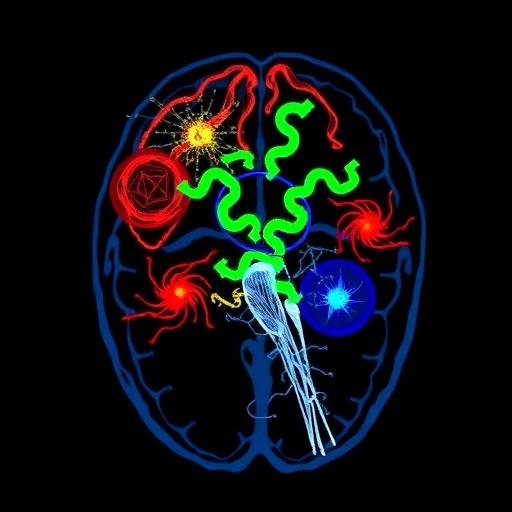Glioblastoma multiforme (GBM) remains one of the most formidable challenges in neuro-oncology, marked by its extreme aggressiveness and resistance to conventional therapeutic strategies. With median survival times rarely exceeding 15 months even under optimal treatment regimens, the demand for innovative therapeutic approaches is urgent. Central to recent advances is the emerging recognition of B-cell lymphoma 6 (BCL6) as a pivotal oncogenic driver within GBM pathology, presenting a compelling target for drug discovery.
In a breakthrough effort to translate these findings into therapeutic innovation, a multidisciplinary team from East China Normal University, Kunming Medical University, and Shanghai Yuyao Biotech Co., Ltd., has engineered a novel small-molecule inhibitor termed YK01. This compound exhibits exquisite specificity for the BTB domain of BCL6, a conserved protein-protein interaction module essential for its transcriptional repressor activity. Through direct binding, YK01 disrupts the interaction between BCL6 and its corepressors, such as SMRT, thereby restoring the expression of tumor suppressor genes under BCL6 control.
.adsslot_2Ugd8oRzl4{ width:728px !important; height:90px !important; }
@media (max-width:1199px) { .adsslot_2Ugd8oRzl4{ width:468px !important; height:60px !important; } }
@media (max-width:767px) { .adsslot_2Ugd8oRzl4{ width:320px !important; height:50px !important; } }
ADVERTISEMENT
Intriguingly, beyond mere competitive inhibition, YK01 also promotes degradation of the BCL6 protein itself, amplifying its anti-tumor effects by initiating a proteolytic downregulation pathway. In vitro experiments demonstrate that YK01 treatment induces DNA damage responses, a hallmark of tumor-suppressive activity, and effectively blocks GBM cell invasiveness and proliferation. This dual mechanism positions YK01 as a paradigm-shifting inhibitor that concurrently neutralizes BCL6’s repressive functions and depletes its cellular levels.
Furthermore, the study explores the synergistic potential of YK01 when paired with temozolomide (TMZ), the current standard-of-care chemotherapeutic agent in GBM management. Combination therapy assays reveal that YK01 not only enhances TMZ’s cytotoxic efficacy but also effectively curtails in situ tumor progression, translating into a substantial survival advantage in treated animal cohorts. This synergy hints at a multifaceted treatment paradigm where targeted BCL6 inhibition complements genotoxic chemotherapy to surmount GBM’s notorious drug resistance.
Molecular interrogation of YK01’s action indicates reactivation of critical tumor suppressor pathways previously silenced by BCL6-mediated transcriptional repression. By relieving the inhibitory influence on genes governing cell cycle checkpoints and apoptosis, YK01 triggers robust DNA damage response signaling, effectively tipping the cellular balance towards growth arrest and programmed cell death. These mechanistic insights provide a rationale for the high efficacy seen in both cellular and animal models.
Importantly, the discovery of YK01 underscores the therapeutic value of focusing on transcriptional repressors, historically considered “undruggable” targets, through a domain-specific small-molecule approach. Its design exemplifies a new class of epigenetic modulators that modulate protein-protein interactions within oncogenic complexes, circumventing limitations of conventional kinase inhibitors or DNA-damaging agents.
The breadth of this research also highlights the indispensable role of integrative bioinformatics approaches in modern oncology drug development. Initial database mining to pinpoint clinically relevant targets, followed by iterative biochemical assays and in vivo validations, epitomizes a comprehensive bench-to-bedside pipeline. This methodological rigor ensures that candidates like YK01 have a robust foundation for clinical translation.
Given GBM’s dismal prognosis and the paucity of effective targeted therapies, the identification and validation of BCL6 as an actionable molecular node represent a paradigmatic shift. YK01’s compelling preclinical profile invites accelerated investigation toward clinical trials, where its synergistic potential with chemotherapy and favorable safety signals merit particular attention.
Beyond glioblastoma, the implications of targeting BCL6 may extend to other malignancies characterized by aberrant BCL6 expression or dysregulated transcriptional repression mechanisms. Tumors of hematopoietic origin, for instance, have historically implicated BCL6, suggesting a broader oncological relevance for inhibitors like YK01.
In conclusion, the development of YK01 as a selective BCL6-BTB domain inhibitor marks a significant advance in the molecular targeting of glioblastoma. Its dual capacity to impede protein function and promote degradation represents an innovative therapeutic paradigm poised to alter the landscape of GBM treatment. As the scientific community continues to unravel the complexity of tumor-specific transcriptional networks, agents like YK01 herald a new era of precision oncology with tangible clinical promise.
Subject of Research: Targeting BCL6 in Glioblastoma Multiforme Using a Novel Small-Molecule Inhibitor
Article Title: Selectively targeting BCL6 using a small-molecule inhibitor is a potential therapeutic strategy for glioblastoma
Web References:
DOI: 10.1016/j.gendis.2025.101644
References:
Original research article published in Genes & Diseases journal.
Image Credits: Min Wu, Lin Zhang, Weikai Guo, Shiyi Lv, Wangrui Jin, Shuangshuang Zhu, Huang Chen, Shuyi Jian, Layang Liu, Yajing Xing, Shihong Peng, Mingyao Liu, Yihua Chen, Zhengfang Yi
Keywords: Glioblastomas, BCL6, small-molecule inhibitor, YK01, transcriptional repression, BTB domain, glioma, DNA damage response, temozolomide synergy, tumor suppressor reactivation
Tags: B-cell lymphoma 6 in glioblastomaBCL6 as a prognostic markercancer cell viability and proliferationdrug discovery in glioblastomaEast China Normal University cancer researchglioblastoma multiforme survival ratesinnovative glioblastoma treatmentsmultidisciplinary cancer researchsmall molecule inhibitors for cancertargeting oncogenic drivers in GBMtherapeutic approaches for neuro-oncologytumor microenvironment interactions





